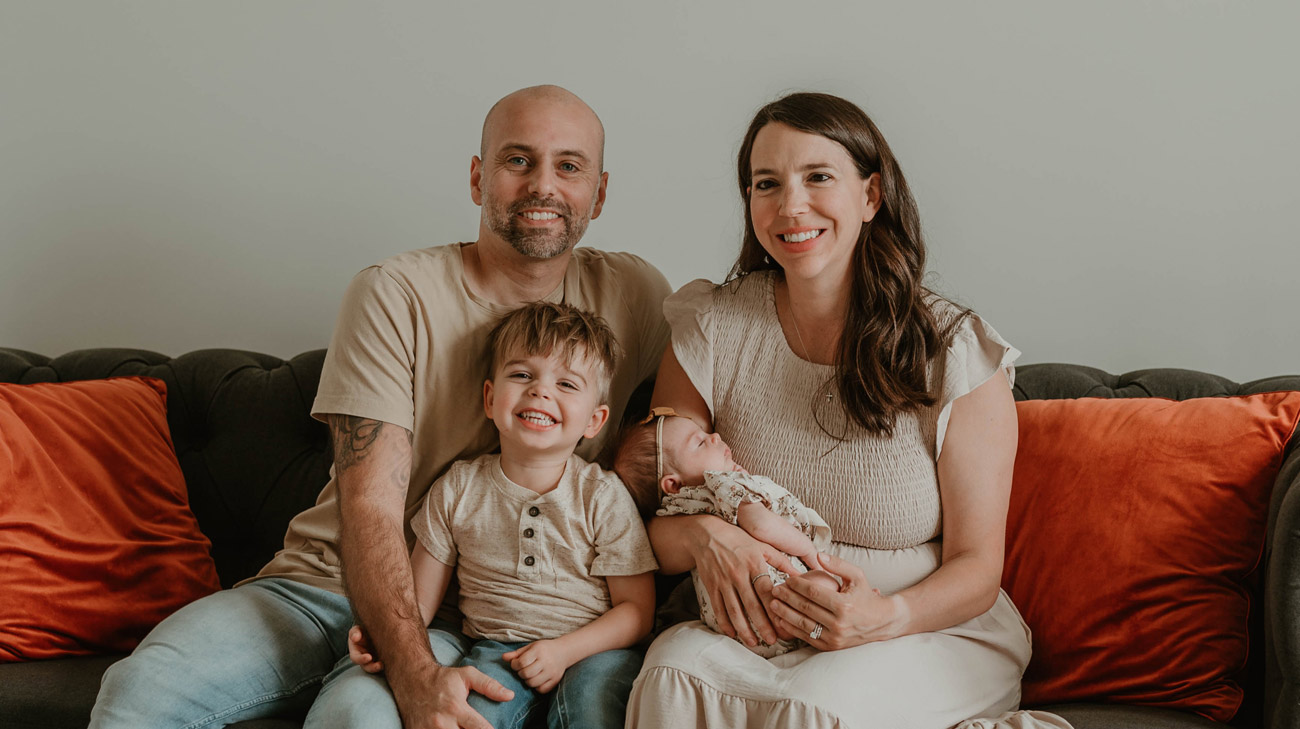
After an uneventful first pregnancy and the birth of their son Max, Allie and Marco Gaudio were expecting the same with their second pregnancy. But a routine prenatal ultrasound at 20 weeks – an anatomy scan – showed swelling in the baby’s kidneys.
Suddenly, the young family was faced with appointments with Cleveland Clinic pediatric urologists and nephrologists that led to a diagnosis of hydronephrosis.
Occurring in 1 in 500 live births, with boys affected more than girls, hydronephrosis occurs during fetal development. In most cases, it resolves on its own, with no further treatment needed. In some cases, however, it is due to an obstruction (blockage) that prevents urine from flowing from the kidneys to the bladder, which leads to the swelling in one or both kidneys.
“Hearing the diagnosis, we assumed the baby was a boy, but we got our girl,” says Allie. “Unfortunately, as my pregnancy progressed, additional ultrasounds and tests showed the problem was not going away so our doctors worked with us to set a birth plan.”
During the last six weeks of her pregnancy, Allie had weekly ultrasounds. Results of an ultrasound and biophysical profile were concerning, so Allie was told to go to Cleveland Clinic Fairview Hospital, where she would be induced that night. Mia Rafaella Gaudio was born on August 17, just two days before her original due date.
Pediatric urologist Jessica Hannick, MD, was on call and went to see the Gaudio’s shortly after Mia’s birth.
“Dr. Hannick talked with us and drew a picture to explain what we were dealing with. We were so comfortable with her from that moment. Prior to being discharged, we had a plan in place,” says Allie.
Dr. Hannick had concerns about both of Mia’s kidneys, though initially thought the right kidney looked good. However, at about eight weeks of age, tests showed that the right kidney was functioning at less than 15%, while the left was functioning at more than 85%.
“From that point on, our goal was to do what was needed to maintain the higher function of the left kidney,” says Dr. Hannick.
Because Mia showed no signs of infection or pain, was doing well and gaining weight, she was scheduled for an open pyeloplasty on the left kidney in February 2024. At six months old, there would be lower risks for long-term cognitive issues from anesthesia.
“It’s a true collaboration between myself, pediatric anesthesia and pediatric nephrology. Together, we set the stage early for the parents. We let them know that if we do the surgery first thing in the morning, pain is controlled, and specific milestones like eating, drinking and peeing are met, the child can go home the same day,” says Dr. Hannick.
Dr. Hannick’s innovative approach makes this major surgery an outpatient ambulatory surgery. It includes collaborating with anesthesia for a regional pain block, removing the urinary catheter in the operating room, and placing a temporary stent/drain tube that can be removed in the office weeks later (rather than requiring a second trip to the operating room which is more typical in pyeloplasty cases).
“We focus on enhanced recovery after surgery (ERAS), with goals of a quick discharge and the best possible pain control,” says Dr. Hannick. “Because the regional pain block targets specific nerves affected during surgery with a non-narcotic medication, patients recover more quickly and can do so in the comfort of their own home.”

After surgery, Dr. Hannick was able to explain that Mia’s hydronephrosis did not resolve on its own because she had a ureteral abnormality – essentially a segment of her ureter that never formed properly.
The Gaudio’s returned home the same day as surgery, then saw Dr. Hannick two weeks later in clinic to have the stent removed. Mia now has a team of doctors who monitor her kidney function and blood pressure, and a very grateful family.
“As a pediatric ICU nurse, I’ve seen babies with kidney issues. Of course, I thought the worst,” says Allie. “We were fortunate to have Dr. Hannick on our team. She’s so innovative, and she really gets to know her patients and their families. We weren’t just another surgery to her.”
Related Institutes: Cleveland Clinic Children's

